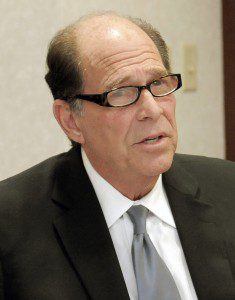By DAN CROWLEY
Staff Writer
The Daily Hampshire Gazette
SPRINGFIELD — Seven lawyers took the first step in U.S. District Court Monday to argue the merits of former Westfield State University President Evan S. Dobelle’s federal lawsuit against university trustees, the state’s higher education chief and an accounting firm.
The 40-page civil suit, filed in October, alleges defamation, breach of contract, civil rights violations and conspiracy, among other claims, which lawyers for the defendants said in court Monday lack substance. After a three-hour hearing on motions to dismiss the complaints, Magistrate Judge Kenneth P. Neiman said he would issue a ruling later.
The federal complaint was filed when Dobelle was placed on paid leave last fall amid investigations into his use of university and foundation funds. The Monday hearing came two weeks after Westfield State trustees approved spending $900,000 in reserve funds to pay the university’s legal bills related to two state investigations into Dobelle’s spending.
Lawyers representing university trustees John Flynn III, Elizabeth D. Scheibel and Kevin R. Queenin, Commissioner of Higher Education Richard M. Freeland, university lawyer James B. Cox and the Braintree accounting firm O’Connor & Drew sought to dismiss the complaint before Neiman Monday. Dobelle also filed a second lawsuit against the university in Hampden Superior Court in December alleging breach of contract.
Jeffrey T. Collins, an assistant attorney general representing the university trustees, asked Neiman to let allegations within Dobelle’s complaint proceed in state and not federal court, saying there are no legitimate federal claims in the case, including one that alleges the defendants violated Dobelle’s rights to freedom of speech. That claim focused on a what was referred to as a “whistleblower” letter, sent from Dobelle’s lead attorney, Ross H. Garber of Hartford, to the university’s lawyers.
“It’s not speech by Dobelle,” Collins told Neiman.
He also said: “It’s a bit of stretch in this context to say there is anything more going on here with Dr. Dobelle than his concerns about himself and his personal interests.”
He said Dobelle’s allegations that university trustees acted outside the scope of their authority in hiring the accounting firm O’Connor & Drew to review Dobelle’s spending of university and Westfield State Foundation money also lacked merit in federal court.
“What we had here is folks in a position of public trust taking a second look at a financial situation,” Collins said.
Garber, Dobelle’s attorney, said the complaint provides “great detail” of intentional misconduct by the university’s board of trustees, including violations of the state’s Open Meeting Law and public statements that damaged his reputation.
He claims trustees and Freeland created a workplace so intolerable that Dobelle had no choice but to resign as president last October.
“Jack Flynn conducted an off-the-books investigation,” Garber said of the board chairman. “This was a serious attack on Dr. Dobelle’s reputation.”
Michael F. Stone, a lawyer representing the university’s lawyer, Michael B. Cox of the law firm Rubin & Rudman, said his client doesn’t belong in the complaint. He said Cox was merely stating a truth in a public meeting when he said that Dobelle had authority to spend up to $500,000 without board approval. Dobelle has a brought a defamation claim against Cox.
“What this boils down to is a fight between Mr. Dobelle and the university over his spending habits and the conduct of this office,” Stone said. He said Dobelle’s case for defamation is “slicing the legal baloney very thin.”
Dobelle’s lawsuit states that, at age 68, his “long-celebrated career has been swiftly, unjustly and perhaps irreparably damaged.”
“In addition to Dr. Dobelle’s reputation,” it continues, “his contract and due process rights — not to mention the interests of the students, faculty, staff and graduates of WSU — have been casualties in Freeland and Flynn’s guerrilla war for control of the university.”
Dobelle’s suit also alleges negligent misrepresentation by O’Connor & Drew. Trustees hired the firm to conduct a financial review of Dobelle’s office that found questionable spending practices and credit card use that violated university policies and subsequently prompted ongoing state investigations. Dobelle had left his previous position as president of the University of Hawaii in 2004 after university officials there raised similar complaints against him.
Michael J. Mascis, a Boston attorney representing the accounting firm, said O’Connor & Drew were providing a service to the board and also should not be a party to the lawsuit, a claim Garber argued against.
“If they had conducted an adequate report and done a professional evaluation, I don’t think we’d be here today,” Garber told Neiman.
Neiman said the charge that the accounting firm’s findings are false or inaccurate appeared “quite general” to him because it lacked specifics.
Neiman suggested to Garber that he could have thrown in “a few false things … to give it some meat on the bone.”
Dan Crowley can be reached at [email protected].


